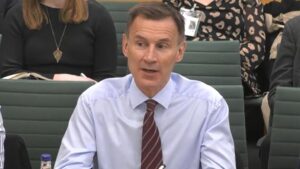The Chancellor, Jeremy Hunt, has given strong hints that he wants to cut taxes in the spring Budget.
Mr Hunt said that countries with lower taxes have more “dynamic, faster growing economies”.
In the Autumn Statement, the chancellor cut national insurance for workers by 2% and announced tax relief for businesses.
If inflation falls this year, followed by lower interest rates, Mr Hunt may have headroom for further tax cuts.
Mr Hunt was speaking during his visit to the World Economic Forum, in Davos, Switzerland, where he is hoping to lure more investment to Britain.
He said the “direction of travel” indicates that economies growing faster than the UK, in North America and Asia tend to have lower taxes.
“I believe fundamentally that low-tax economies are more dynamic, more competitive and generate more money for public services like the NHS,” he added.
Mr Hunt did not offer any further detail on the scale of potential future tax cuts, as the government awaits a forecast from the Office for Budget Responsibility.
However, it is widely expected that the chancellor will focus on income tax in the Budget on 6 March.
Currently, the overall tax burden is on course to rise to the highest level for decades as households are pushed into higher income tax brackets as a result of tax thresholds remaining the same levels for more than two years.
Usually tax thresholds rise in line with inflation, the rate at which prices increase, but they have been kept the same since 2021 and will remain frozen until 2028.

